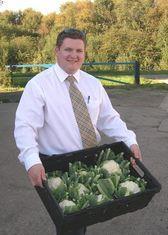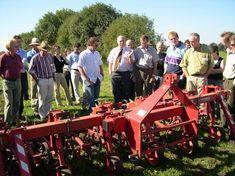

Downward price pressures could affect the long-term sustainability of growing organic field scale vegetables to meet supermarket specifications. But is technically possible, according to growers at the Henry Doubleday Research Association’s (HDRA) Beyond Conversion open day at Pollybell Farms.
Chris Firth of HDRA illustrated thst falling prices for organic growers are increasing economic pressure. Organic growers are reliant upon the performance of high value vegetables to support lower levels of income from other parts of the rotation, such as fertility building and break crops, he said.
Dan Carr of vegetable packing company Marshalls predicted continued single figure growth in the market. He stressed that prices to producers should not be cut, as there are other places in the supply chain where savings can be made. He also said that although supermarket sales are slowing, alternative markets such as box schemes are growing more rapidly.
Pollybell Farms hosted 70 delegates interested in the results and practical applications of research from HDRA and the University of Warwick. Mel Miles of Marshalls, which sponsored the event, said: “Such focused research and development specific to organics is essential and must continue for years to come.”
Pollybell Farms has converted 661 hectares to organics over the past seven years and is cropping 200ha of vegetables this season to supply Marshalls. During the day, attendees shared experiences and solutions to the technical challenges of growing organic vegetables for the supermarkets.
One example of this is the introduction of an eight-row bed system for growing bunched carrots. This can be a very profitable crop to grow, but requires very careful management - especially in weed control where tolerance is extremely low. The eight-row bed system with a specially modified brush weeder allows far greater accuracy in mechanical weeding resulting in drastic reductions in costs of hand weeding.
Direct applications of focused research and development can be seen in action in key areas of crop management at Pollybell. The farm now uses birdsfoot trefoil seeded in the modules in all brassica crops to control cabbage root fly, as a direct result of studies done at Warwick University by Dr Rosemary Collier.



